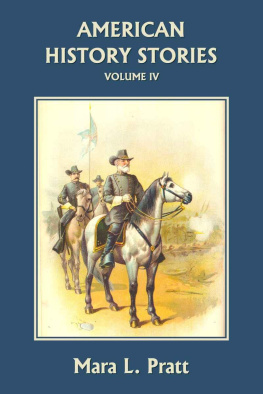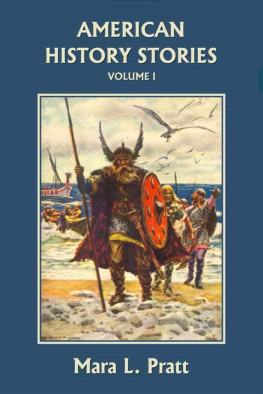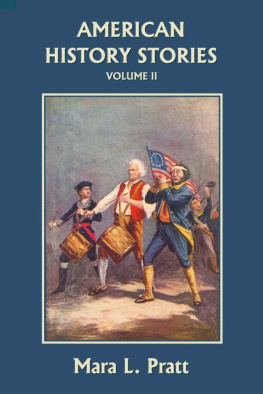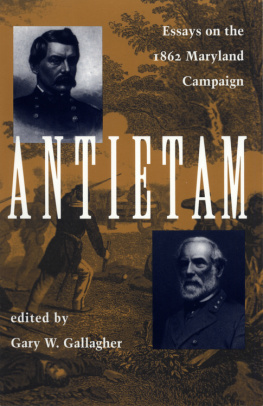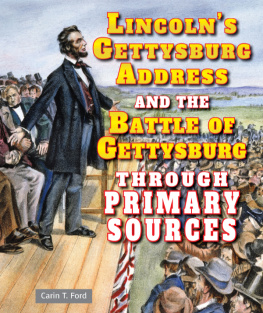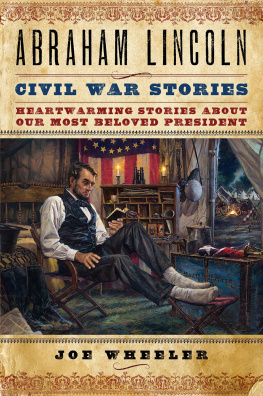Mara L. Pratt - American History Stories, Volume IV
Here you can read online Mara L. Pratt - American History Stories, Volume IV full text of the book (entire story) in english for free. Download pdf and epub, get meaning, cover and reviews about this ebook. year: 2007, publisher: Yesterdays Classics, genre: History. Description of the work, (preface) as well as reviews are available. Best literature library LitArk.com created for fans of good reading and offers a wide selection of genres:
Romance novel
Science fiction
Adventure
Detective
Science
History
Home and family
Prose
Art
Politics
Computer
Non-fiction
Religion
Business
Children
Humor
Choose a favorite category and find really read worthwhile books. Enjoy immersion in the world of imagination, feel the emotions of the characters or learn something new for yourself, make an fascinating discovery.
- Book:American History Stories, Volume IV
- Author:
- Publisher:Yesterdays Classics
- Genre:
- Year:2007
- Rating:4 / 5
- Favourites:Add to favourites
- Your mark:
- 80
- 1
- 2
- 3
- 4
- 5
American History Stories, Volume IV: summary, description and annotation
We offer to read an annotation, description, summary or preface (depends on what the author of the book "American History Stories, Volume IV" wrote himself). If you haven't found the necessary information about the book — write in the comments, we will try to find it.
American History Stories, Volume IV — read online for free the complete book (whole text) full work
Below is the text of the book, divided by pages. System saving the place of the last page read, allows you to conveniently read the book "American History Stories, Volume IV" online for free, without having to search again every time where you left off. Put a bookmark, and you can go to the page where you finished reading at any time.
Font size:
Interval:
Bookmark:
Volume IV
All rights reserved. No part of this book may be reproduced or retransmitted in any form or by any means without the written permission of the publisher.
This edition, first published in 2010 by Yesterday's Classics, an imprint of Yesterday's Classics, LLC, is an unabridged republication of the work originally published by Educational Publishing Company in 1891. This title is available in a print edition (ISBN 978-1-59915-205-9).
Yesterday's Classics republishes classic books for children from the golden age of children's literature, the era from 1880 to 1920. Many of our titles are offered in high-quality paperback editions, with text cast in modern easy-to-read type for today's readers. The illustrations from the original volumes are included except in those few cases where the quality of the original images is too low to make their reproduction feasible. Unless specified otherwise, color illustrations in the original volumes are rendered in black and white in our print editions.

ABRAHAM LINCOLN
A BRAHAM L INCOLN was the President during this dark time in our nation's history,the Civil War.
He was not a handsome man, not an educated man, not a society-mannered man; but a more honest, more loyal-hearted, more grand-souled man than Abraham Lincoln, never stood at the head of our government. He was as honest as George Washington, as sturdy as Andrew Jackson, as brave as the bravest General, and, in the end, as noble as the noblest martyr.
He had had a hard life as a boy. He had been brought up on a Kentucky farm, where he had learned to hoe and to plant, to drive oxen, to build log-houses, to split rails, to fell trees;everything that a farmer boy away out in a new country would have to do, this boy had done. Indeed, when he was named for President by the Republican party, the opposing parties sneered at him, calling him a "vulgar rail-splitter," "an ignorant boor, unfit for the society of gentlemen."

LINCOLN'S FIRST HOUSE IN ILLINOIS
But for all his hoeing and his rail-splitting, for all his poverty and his hard labor, for all his rough home and his common companions, Abraham Lincoln soon proved that he had a something in his head and in his heart that any gentleman might well have been proud to owna something that a world of fine houses and fine clothes could not buy something which, by and by, prompted him to set all the poor black men and women free.
Although Abraham Lincoln did live in the backwoods, and did not go to school, nevertheless, he was all this time in the best of society. Fortunately for him, his mother was a real lady in heart, and tried always to keep her boy from growing up a coarse, ignorant "rail-splitter," as his party opponents called him. She taught him always to keep his eyes open, and his thoughts awake to the beauties about him in nature. She taught him that it was a noble heart that could see God in the beautiful flowers, in the birds, in the fields, in the forests, and in the waters; that it was the artist's soul that loved to watch the beautiful sunset lights and the deepening shadows; she taught him to read the few books that she owned, and helped him to earn a few more; she encouraged his love for reading, and was careful that his reading was always of the best kind.
The result was, that when Abraham Lincoln came to be President, and had to write letters and make speeches, he always had the very best style of English at his command. When he said a thing, it was so simply and so correctly said, that every one knew just what he meant. And behind his words, too, there was always his big, honest, truthful heart. Is it any wonder, then, when, by and by, this good man diedshot down by an enemy of our Unionthat all the country mourned for him, and felt for a time as if no one could be found to fill this good, great man's place.
Here is what a good woman says of him: "When Abraham Lincoln wrote a thing, you read what he meant. The meaning was not covered up under a heap of useless words. One thing was apparent in him from boyhood. This was his straightforward truthfulness and sincerity of purpose. No political experience ever twisted him; he ended life as he began it, an honest, sincere, trustworthy man. One of the great outcries against him by his opponents after he was elected was, 'He is an uncouth, rough backwoodsman. He is no gentleman .' It is true that he was very uncouth in face and figure; never handsome to look at, although the soul of the man sometimes shone through the plain features in a way that transfigured them, and his deep gray eyes were full of a great sadness, that seemed almost to prophesy his tragic fate. He had not the manners of a court, but he did deeds from the promptings of a simple, manly heart that a king might have been proud to own, and if he was not a true gentleman, God does not make many now-a-days."
When the Republicans chose Abraham Lincoln, the South was furiousnot because they had chosen Lincoln, because they had chosen any one at all. "If a Republican President is elected," said these Southern States, "we will go out of the Union."
Now, it is said that the Southerners really were in hopes that a Republican President would be elected, so that they might have an excuse for leaving the Union. "We will go off by ourselves," said one of the Southern leaders, "and build up a government of our own; and we will have slavery for its very corner stone." They were very angry, these Southern slave-holders; for one reason, because they were now made by the United States Government to pay such high prices for slaves. One slave-dealer said, he wasn't going to pay a thousand dollars for a slave in Virginia, when he could go to Africa and buy better ones for fifty dollars a head! What do you think of a business that employed agents to catch colored men and women as you would catch animals, bring them into market, and sell them at a price, according to their size, or weight, or age, or strength for work!
We ought all to be glad that the United States Government at last came to its senses, and made all the States give up this wicked traffic.
Lincoln was in due time elected President, and the Southern States, as they had threatened, declared themselves no longer members of the Union. They made for themselves a new government, put Jefferson Davis at its head as President, and called themselves "The Confederate States of America."

JEFFERSON DAVIS
These Southerners believed that, although the States had all at one time banded together under one government, still each State had a right to step out and set up a government of its own if it chose. This is what John C. Calhoun said in his speeches before Congress, and without doubt he believed what he said was true. This was the same old question of "State rights" of which you heard away back as far as when Washington was President. Don't you remember how jealous of each other the political parties were even in those early times? How afraid one party was that too much power would be given to the central government, that is, to the President and Congress? And how equally afraid the other party was that the power would be too much scattered around among the different States? And do you remember in Jackson's administration, that some of these same Southern States declared the central government "null and void," and said they had a right to leave the Union if they wanted to? They even went so far as to form a league, and would really have made trouble enough had not Jackson rushed down upon them before they had time to do any mischief.
Font size:
Interval:
Bookmark:
Similar books «American History Stories, Volume IV»
Look at similar books to American History Stories, Volume IV. We have selected literature similar in name and meaning in the hope of providing readers with more options to find new, interesting, not yet read works.
Discussion, reviews of the book American History Stories, Volume IV and just readers' own opinions. Leave your comments, write what you think about the work, its meaning or the main characters. Specify what exactly you liked and what you didn't like, and why you think so.

